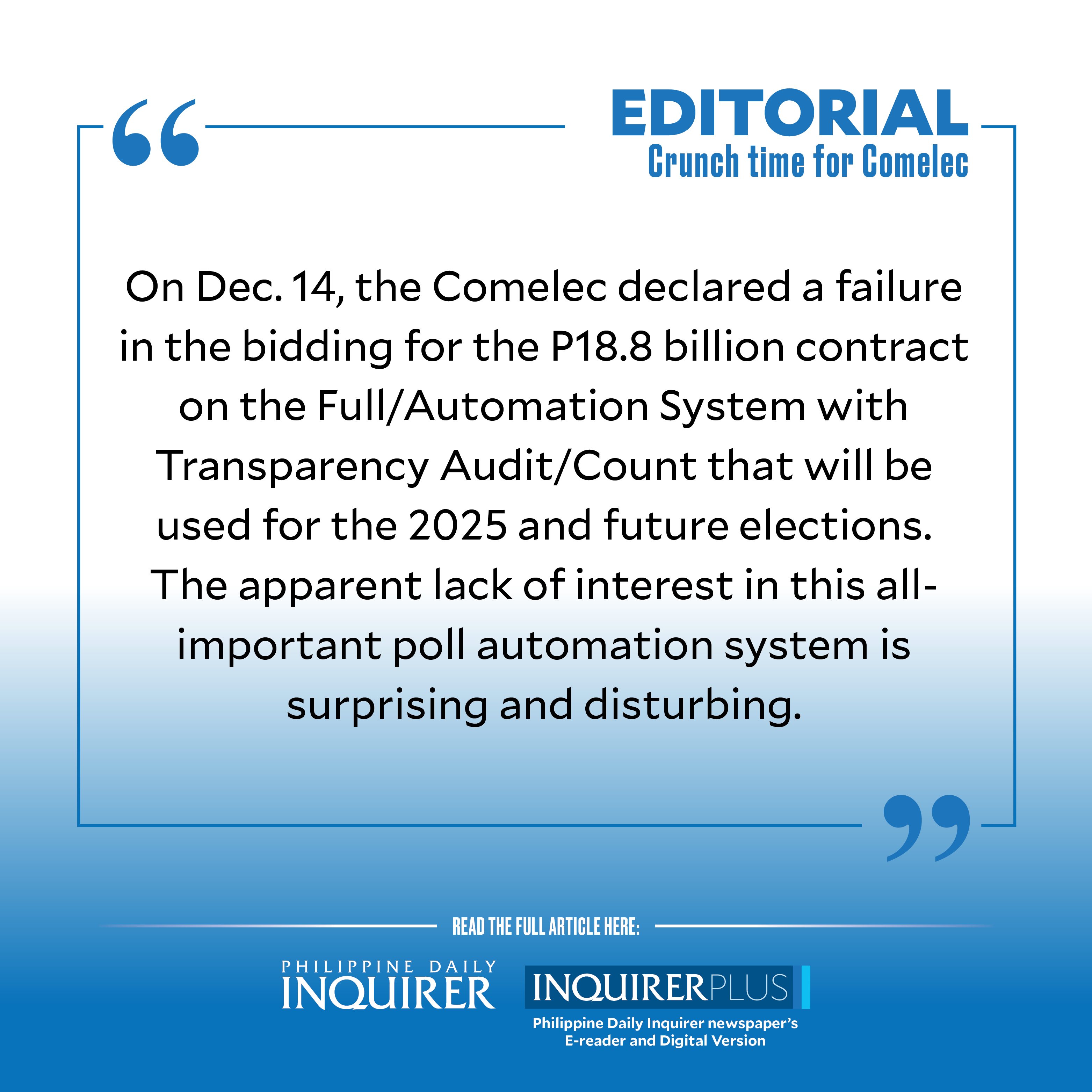Crunch time for Comelec

With the midterm national and local elections just a year-and-a-half away, the Commission on Elections (Comelec) is hard-pressed to come up with a credible and fail-safe automated election system (AES) to replace that of its controversial longtime technology provider, Smartmatic Philippines Inc.
Unfortunately, recent developments do not bode well in that direction. On Dec. 14, the Comelec declared a failure in the bidding for the P18.8 billion contract on the Full/Automation System with Transparency Audit/Count that will be used for the 2025 and future elections. The apparent lack of interest in this all-important poll automation system is surprising and disturbing.
The initial bidding involved a lone bidder—Miru Systems Co. Ltd. of South Korea—which was, however, rendered ineligible as its documents did not comply with the requirements of the country’s procurement laws and were not translated into English.
Disappointing responseBut only Miru turned up for the bidding that initially had Pivot International Inc. and Smartmatic as the other companies that had expressed interest as of the original Dec. 12 deadline. With no other bidders purchasing the P75,000 bid documents, Comelec special bids and awards committee chair Allen Francis Abaya said on Dec. 22 that the poll body was extending its deadline for the submission of bids to Jan. 8, to “give ample time to all bidders to prepare their bids due to the magnitude and numerous requirements of the project.”
Such disappointing response should push the Comelec to do better in terms of attracting qualified, credible, and serious companies that will provide the AES, considering its importance and impact on the country’s democratic exercise.Fraud-prone manual votingSince the government finally did away with the fraud-prone manual voting and embarked on automated elections in 2010, the country had known only Smartmatic technology in its elections.
However these automated systems were not without hiccups. Voters still experienced long queues exacerbated by unfamiliarity with automated voting, the incessant breakdown of the voting machines and the lack of transparency in the process which led to questions about the integrity of the election results. Such was the case in the 2022 elections, with unusually fast results giving then presidential candidate Ferdinand Marcos Jr. a resounding majority over his rivals in just a matter of hours.
Money laundering caseThe phenomenon prompted a group led by former information and technology chief Eliseo Rio Jr. to question the use of a private single internet protocol address in the transmission of the election results, and start a petition campaign against Smartmatic for alleged automated irregularities.
The Comelec took pains to stress that it had disqualified Smartmatic from participating in “all Comelec procurement” not because of questions on the credibility of the 2022 elections, but due to the money laundering case in the United States against former Comelec chair Andres Bautista. Bautista allegedly received $1 million to award the 2016 elections contract to Smartmatic, a charge that both Bautista and Smartmatic have denied. Smartmatic in fact sought a temporary restraining order from the Supreme Court against the Comelec’s decision, an indication that it had not given up its bid to be part of Philippine elections.Painful lessonsComelec chair George Garcia meanwhile staunchly defended the poll body’s decision against Smartmatic. “We have to maintain the integrity of our electoral process,’’ he said, adding that the bribery allegations “not only undermine and cast a shadow over the procurement protocols, but also threaten to erode the public’s confidence in the electoral system.”
Garcia is on the right track in recognizing this imperative, and should make that the Comelec’s absolute and primary consideration in its search for a new voting technology. The poll body must track the painful lessons it has learned from Smartmatic’s spotty record, and include these insights into the terms of reference and requirements for the new AES.
Narrow windowThe AES must be “auditable” as well, and can be subjected to “independent verification and examination” by-election partners, the poll watchdog National Citizens’ Movement for Free Elections has suggested, adding that this would ensure the transparency and credibility of the entire election process.
It’s definitely crunch time for the Comelec, given that a new AES would require not only the tedious process of vetting, testing, and actual use by the poll body, but also the more critical task of educating and familiarizing the public with this new technology. A year-and-a-half certainly seems too narrow a window to ensure the promised honest, peaceful, and orderly elections under a new AES.
Sadly, the Comelec has yet to take its first step—that of finding a new poll technology provider for the upcoming elections. The poll body must drum up the importance of this huge undertaking lest it falls anew into the arms of that spurned provider, Smartmatic.




















